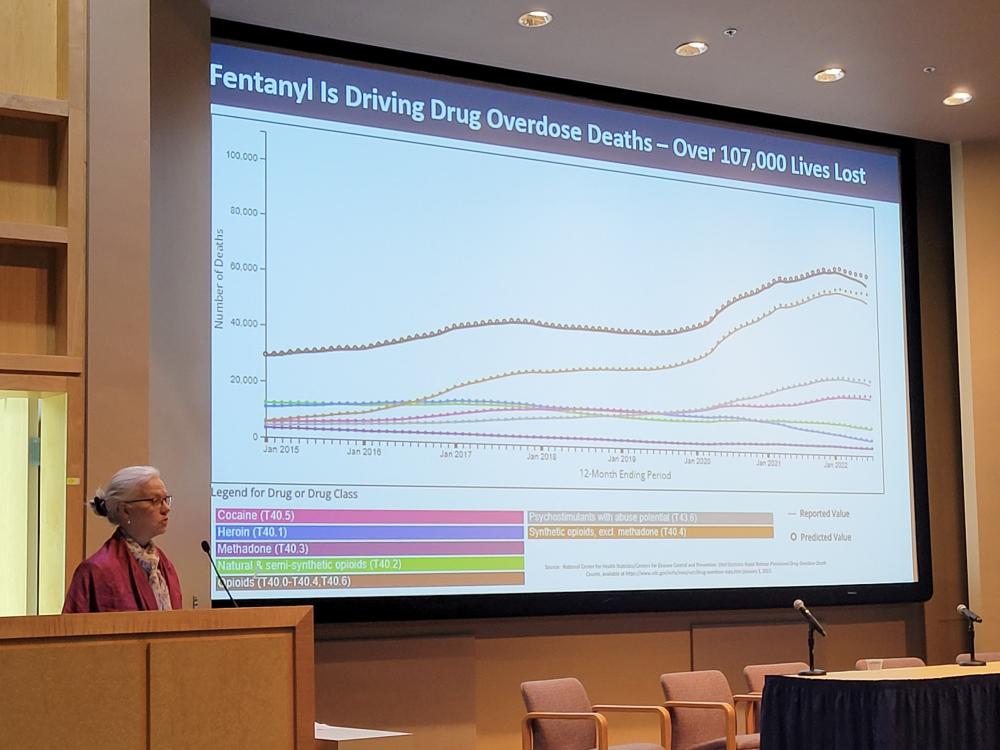
The Penn State Consortium on Substance Use and Addiction (CSUA) recently hosted its fourth annual conference in the HUB-Robeson Center at the University Park campus.
Drawing over 150 attendees throughout the day, including through the Zoom livestream, the conference kicked off with a welcome from Paul Griffin, the director of CSUA and professor of industrial and manufacturing engineering.
A roundtable discussion followed featuring several researchers including presentations from Dr. Sarah Kawasaki, assistant professor of medicine, psychiatry, and behavioral health and CSUA executive board member, and Dr. Aleksandra Zgierska, professor of family and community medicine, public health sciences and anesthesiology and perioperative medicine at Penn State College of Medicine. Kawasaki and Zgierska discussed the current issues facing the field of substance use and addiction as well as how the College of Medicine and other campuses can work together on these issues.
“Penn State is serving to help as a builder of infrastructure to figure out how to define success and how to report metrics back to funders ... to try to expand access to care,” said Kawasaki regarding the opioid crisis.
In addition, Abby Jones, assistant professor of human development and family studies, and Louisa Holmes, assistant professor of geography and demography, who are both Social Science Research Institute (SSRI) co-funded faculty members through CSUA, presented about their work on opioid use disorder.
Stephanie Lanza, former CSUA director and the director of the Edna Bennett Pierce Prevention Center, presented briefly about CSUA’s growth and engagement activities afterwards.
“We’re five years in [to CSUA’s existence]; we’re growing in strength and numbers, and we need to attend to the critical issues that continue to face us as a community,” said Lanza.
After the roundtable, the first panel session featured an in-depth discussion of the opioid settlement, and was moderated by Glenn Sterner, assistant professor of criminal justice at Penn State Abington and CSUA co-funded faculty member, and Louisa Holmes, the panel discussed the opioid settlement and how Pennsylvania as well as other states were figuring out how to best disperse the money from the settlement throughout the states and localities.
The second morning panel session focused on neonatal and maternal issues and opioid use disorder among pregnant women, which was moderated by CSUA co-funded faculty members, Kristina Brant, assistant professor of rural sociology, and Rina D. Eiden, professor of psychology, the panel discussed the difficulty that pregnant women with opioid use disorder face as they receive maternal care and access substance use treatment services.
The conference featured a poster session during the lunch break, which allowed dozens of researchers and graduate students to present their work, fostering strong engagement with attendees. Miglena Ivanova, a third-year doctoral student in developmental psychology and a Prevention and Methodology Training (PAMT) predoctoral fellow, won the Best Poster Award for her work: “Profiles of Co-Occurring Internalizing and Externalizing Problems and Adolescent Substance Use.”
The afternoon featured two rounds of research talks from researchers across the Penn State system, and included topics such as recovery community centers, stigma reduction efforts among law enforcement, hit doctors, Good Samaritan laws, and more. The research talks were moderated by CSUA co-funded faculty members, Sujeong Park, assistant professor of health policy and addiction studies at the School of Public Affairs at Penn State Harrisburg, and Brandy Henry, assistant professor of education.
The closing keynote speaker, Dr. Yngvild Olsen, director of the Center for Substance Abuse Treatment (CSAT) at the Substance Abuse and Mental Health Services Administration (SAMHSA), spoke about the work that SAMHSA is currently doing regarding opioids but other substance use and addiction-related issues like provider waivers, stigma reduction, and new harm reduction efforts.
“We still have this big barrier of stigma," said Olsen. "and we know it keeps people from accessing services; it keeps people from staying in services."
Griffin said, “The conference touched on a lot of different issues and themes, but the issue of stigma of substance use disorders and addiction in general came up consistently throughout the various panels and presentations. Going forward, we hope that CSUA’s efforts will cause more systematic change as we continue tackling substance use disorder and addiction in a post-COVID-19 world.”
The CSUA, part of the Social Science Research Institute, draws on the expertise of researchers, educators, and practitioners from across Penn State to develop and implement effective programs, policies and practices aimed at preventing and treating addiction and its spillover effects on children, families and communities.
Those who missed this year’s conference can watch the entire Zoom livestream of the conference is available on SSRI’s website. Follow CSUA’s work on Twitter and subscribe to the monthly newsletter for more updates about research, events and other opportunities.